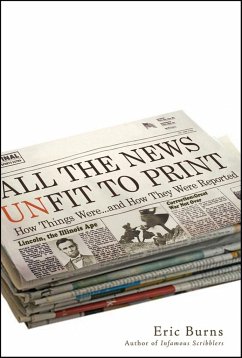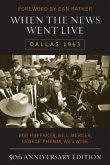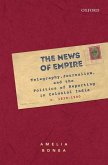What if Sam Adams had reported the facts instead of using his pen and imagination to stoke the flames of anti-British rebellion? What if William Randolph Hearst had not relentlessly commanded Americans to "remember the Maine"? What if New York Times reporter Walter Duranty had not let Communist sympathies keep him from accurately reporting the Ukrainian famine of the 1930s and the brutality of Stalin's Five-Year Plan? The history of American journalism is rife with errors, omissions, pranks, and downright lies. Some of these have actively influenced events and shaped history, while others have prompted little more than raised eyebrows and wry amusement. In "All the News Unfit to Print," veteran journalist and media analyst Eric Burns surveys two centuries of American history to reveal how the media have gotten history wrong and how their mistakes distorted our view and under-standing of the past. Burns offers fascinating examples from the entire spectrum of journalistic wrongdoing, from unintentional errors to deliberate deceptions motivated by greed, bias, arrogance, or self-promotion. Ben Franklin created the false "Trial of Miss Polly Baker" story in an attempt to improve women's lives. A bored Samuel Clemens exercised his mastery of the hoax in a piece on the discovery of a hundred-year-old "Petrified Man," a tale made up of whole cloth, not mummified remains. H. L. Mencken accelerated the news in his "synthetic war dispatch," reporting details of a major Russo-Japanese War battle nearly two weeks before actual battlefield reports became available. Years later, circulation-boosting journalists around the country shamelessly invented incriminating facts-and one even tampered with evidence--in condemning the German carpenter accused in the infamous Charles Lindbergh baby kidnapping case. Through these and many other stories, Burns traces the remarkable evolution of American journalism from its undisciplined beginnings as a profession from which little was expected in the way of truth or accountability to the gradual evolution of standards of objectivity (or at least transparent bias) and veracity which, while not always met, are accepted as the norm today. Written with insight and flair, "All the News Unfit to Print" is essential reading for anyone interested in American history and in controversies about the accuracy and bias of the nation's media coverage.








